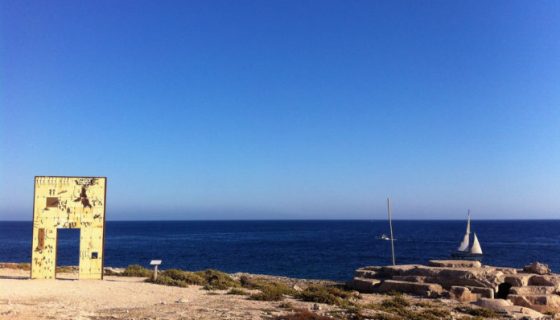- Mediterranean Hope - Federazione delle chiese evangeliche in Italia
- mh@fcei.it
A Perfect Storm
by Alice Fagotti, MH’s operator at the Observatory of Migrations in Lampedusa
Rome (NEV), April 5, 2017 – It was the beginning of December when the news came in Lampedusa: the withdrawing of civil society rescue ships which until then had been engaged in search and rescue activities (SAR) in the central Mediterranean Sea. Only the Aquarius – the ship of Sos Méditerranée would remain in the sea, all the others had already returned to the port. As Mediterranean Hope Observatory operators, we began discussing about this fact. We could no longer ignore our concerns about the developing situation at sea – a situation which, however, left us with many open questions.
We were wondering if the scenario would follow the one of the year before, when some ships had chosen to retire during Winter – the season in which the number of departures from the Libyan coasts significantly decreased. Or if the choice was caused by the greater involvement of the Libyan authorities, as envisaged in the framework of Operation Sophia which has been still in force also entailing the training of the Libyan Coast Guard. Finally, we thought it could be a more trivial matter of economic resources, the day-to-day management of these ships requires huge investments. After a terrible year like 2016, during which more than five thousand people perished at sea, we wondered how many more deaths were to count.
The cold season was approaching, and on top of our hypothesis and conjecture there was the discomfort of not seeing those ships loaded with people – coloured crews that were mostly made of volunteers who were committed to taking care of people, making them smile well before reaching Molo Favaloro in Lampedusa.
The fact is that only a few days later, on December 15, we read the heavy charges made by the European agency Frontex against those NGOs accused of collusion with traffickers of human beings. Then, in February, the Risk Analysis 2017 report was issued in which rescuers close to the Libyan coasts were called “pull factors”, that means an attractive factor for migrants leaving the Libyan coasts. Again, in February, such charges were followed by the investigations (that seem to be still ongoing) from the Procura of Catania which were made on the NGOs that have been voluntarily carrying out search and rescue operations. And, that is the today matter of debating for a part of the Italian public opinion also because some television services – smartly built by entertainment programmes which, as we know, do not deepen and leave no room for contradictory but create a possible reality through precise narrative styles that more than informing orientate the same public opinion.
All these conditions have traced a more complex and disturbing picture than eve could expected a few months ago. While the NGOs prepare to reply about the legitimacy of their presence at sea (for us who have looked at the world from Lampedusa this presence seems to be a humanitarian duty in the absence of legal and safe ways to migrate), we wonder why those media that reach millions of viewers are not interested in thoroughly investigating the reasons for these people to leave their countries of origin, risking their lives without any certainty of being saved. We wonder why public opinion should be threatened and not reassured by the fact that in the Mediterranean Sea there are volunteers from the civil society that can, and want to tell the world what is happening. Why not consider the presence of these ships (which over 2016 have rescued about 28% of the people left to save) an added value and a useful tool of cooperation between all the forces that are involved in sea rescue operations instead of accusing them of being smugglers?
Recent days news informs us that about 655 people perished at sea since the beginning of 2017. The closure of European boundaries, which goes through the agreements with Turkey and Libya, added to the above-mentioned charges against the NGOs, have been reducing and endangering the legitimacy of rescuing operations. All this is likely to create a perfect storm at the expenses of those people who flee because they simply have no alternatives. And it is in the perfect storm that even the truth is lost.
Rome (NEV), April 5, 2017 – It was the beginning of December when the news came in Lampedusa: the withdrawing of civil society rescue ships which until then had been engaged in search and rescue activities (SAR) in the central Mediterranean Sea. Only the Aquarius – the ship of Sos Méditerranée would remain in the sea, all the others had already returned to the port. As Mediterranean Hope Observatory operators, we began discussing about this fact. We could no longer ignore our concerns about the developing situation at sea – a situation which, however, left us with many open questions.
We were wondering if the scenario would follow the one of the year before, when some ships had chosen to retire during Winter – the season in which the number of departures from the Libyan coasts significantly decreased. Or if the choice was caused by the greater involvement of the Libyan authorities, as envisaged in the framework of Operation Sophia which has been still in force also entailing the training of the Libyan Coast Guard. Finally, we thought it could be a more trivial matter of economic resources, the day-to-day management of these ships requires huge investments. After a terrible year like 2016, during which more than five thousand people perished at sea, we wondered how many more deaths were to count.
The cold season was approaching, and on top of our hypothesis and conjecture there was the discomfort of not seeing those ships loaded with people – coloured crews that were mostly made of volunteers who were committed to taking care of people, making them smile well before reaching Molo Favaloro in Lampedusa.
The fact is that only a few days later, on December 15, we read the heavy charges made by the European agency Frontex against those NGOs accused of collusion with traffickers of human beings. Then, in February, the Risk Analysis 2017 report was issued in which rescuers close to the Libyan coasts were called “pull factors”, that means an attractive factor for migrants leaving the Libyan coasts. Again, in February, such charges were followed by the investigations (that seem to be still ongoing) from the Procura of Catania which were made on the NGOs that have been voluntarily carrying out search and rescue operations. And, that is the today matter of debating for a part of the Italian public opinion also because some television services – smartly built by entertainment programmes which, as we know, do not deepen and leave no room for contradictory but create a possible reality through precise narrative styles that more than informing orientate the same public opinion.
All these conditions have traced a more complex and disturbing picture than eve could expected a few months ago. While the NGOs prepare to reply about the legitimacy of their presence at sea (for us who have looked at the world from Lampedusa this presence seems to be a humanitarian duty in the absence of legal and safe ways to migrate), we wonder why those media that reach millions of viewers are not interested in thoroughly investigating the reasons for these people to leave their countries of origin, risking their lives without any certainty of being saved. We wonder why public opinion should be threatened and not reassured by the fact that in the Mediterranean Sea there are volunteers from the civil society that can, and want to tell the world what is happening. Why not consider the presence of these ships (which over 2016 have rescued about 28% of the people left to save) an added value and a useful tool of cooperation between all the forces that are involved in sea rescue operations instead of accusing them of being smugglers?
Recent days news informs us that about 655 people perished at sea since the beginning of 2017. The closure of European boundaries, which goes through the agreements with Turkey and Libya, added to the above-mentioned charges against the NGOs, have been reducing and endangering the legitimacy of rescuing operations. All this is likely to create a perfect storm at the expenses of those people who flee because they simply have no alternatives. And it is in the perfect storm that even the truth is lost.





